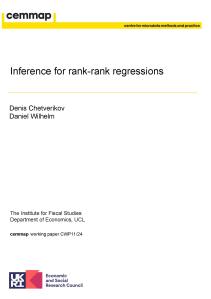We set out a theoretical framework for the systematic consideration of ‘randomisation bias’, estimate the causal impact of randomisation on participation patterns in an actual trial, and propose a non-experimental way of assessing the extent to which the experimental impacts are representative of the impacts that would have been experienced by the study sample that would have been obtained in the absence of random assignment. We also extend our estimator to deal with binary outcomes and to account for selective survey non-response, and explore partial and point identification of the parameter of interest under alternative assumptions on the selection process.
Authors

Barbara Sianesi
Journal article details
- DOI
- 10.1016/j.jeconom.2017.01.003
- Publisher
- Elsevier
- JEL
- C14; C21; J18; J38
- Issue
- Volume 198, Issue 1, May 2017, pages 41-64
Suggested citation
Sianesi, B. (2017). 'Evidence of randomisation bias in a large-scale social experiment: The case of ERA' 198, Issue 1(2017), pp.41–64.
More from IFS
Understand this issue

Gender norms, violence and adolescent girls’ trajectories: Evidence from India
24 October 2022

What are the challenges in getting debt on a falling path?
28 June 2024

Election Special: Your questions answered
27 June 2024
Policy analysis

IFS Deputy Director Carl Emmerson appointed to the UK Statistics Authority Methodological Assurance Review Panel
14 April 2023

ABC of SV: Limited Information Likelihood Inference in Stochastic Volatility Jump-Diffusion Models
We develop novel methods for estimation and filtering of continuous-time models with stochastic volatility and jumps using so-called Approximate Bayesian Compu- tation which build likelihoods based on limited information.
12 August 2014

Is there really an NHS productivity crisis?
17 November 2023
Academic research

Inference for rank-rank regressions
28 May 2024

Sample composition and representativeness on Understanding Society
2 February 2024

The impact of labour demand shocks when occupational labour supplies are heterogeneous
28 June 2024